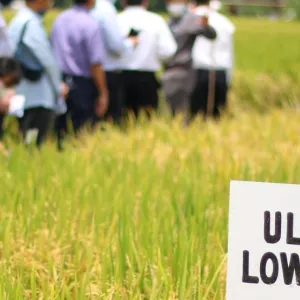IRRI researchers identify genes for low glycemic index and high protein in rice
LOS BAÑOS, Philippines (30 August 2024) – A team of researchers at the International Rice Research Institute (IRRI) has identified genes and markers responsible for low glycemic index (GI) and high protein content in rice, using genetics and artificial intelligence classification methods. Their study, recently published in the Proceedings of the National Academy of Sciences (PNAS) , revealed a superior

IRRI researchers identify genes for low glycemic index and high protein in rice
LOS BAÑOS, Philippines (30 August 2024) – A team of researchers at the International Rice Research Institute (IRRI) has identified genes and markers responsible for low glycemic index (GI) and high protein content in rice, using genetics and artificial intelligence classification methods.
Their study, recently published in the Proceedings of the National Academy of Sciences (PNAS) , revealed a superior set of lines that exhibited ultra-low GI (below 45%) with an unprecedented protein level (15.99), which is twice the content usually found in conventional milled rice. Rice varieties with higher protein content may contribute to slower digestion and absorption rates, potentially helping control blood glucose levels, further enhancing its ultra-low GI characteristics.
“Collectively, these findings underscore the stacked potential and benefits of low GI and high protein rice to offer a substantial source of protein and essential amino acids such as lysine for consumers, particularly in regions where rice is a dietary staple,” said Dr. Nese Sreenivasulu, corresponding author of the paper and Principal Scientist at the IRRI Grain Quality and Nutrition Center. He adds that the lines included in the study also generated yields comparable to existing high-yielding rice varieties.
The healthier rice lines were developed by intercrossing an inbred variety from Samba Mahsuri and the amylose extender of IR36. The results could help address the growing incidence of diabetes and the need for adequate protein intake for hundreds of millions of people at risk.
Globally, about 537 million adults suffer from diabetes, and the number is expected to grow to 783 million by 2045. Low- and middle-income countries account for more than three-quarters of diabetes incidences, with Asia accounting for 60 percent of the global diabetic population. High-protein rice may help…

